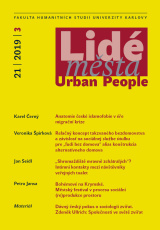Anatomie české islamofobie v éře migrační krize
DOI:
https://doi.org/10.14712/12128112.3233Klíčová slova:
islamophobia, anti-Muslim politics, migration, Muslims, Czech RepublicAbstrakt
This review article focuses on the phenomena of Islamophobia and its research in the Czech Republic with a particular emphasis on the era of the so-called migration crisis (2014–2016). It is mainly based on the findings of four ground-breaking team research projects published in several milestone collective monographs in the research field: the primarily sociological and anthropological empirical research done by Daniel Topinka and his extensive team around Palacky University in Olomouc, the primarily political science research done by Přemysl Rosůlek and his collaborators from Western Bohemian University in Pilsen, the primarily political science research done by Miroslav Mareš and his team around Masaryk University in Brno, and the interdisciplinary, both empirical and theoretical, however loosely connected, research project organized by Bronislav Ostřanský and Ondřej Beránek, with their backgrounds in Middle Eastern studies. The article tries to put the main findings of the four as yet isolated research projects together, to make them communicate with each other, to show both the convergence as well as divergence in their analyses, and, where possible, offer the author’s own alternative interpretations. The aim of this enterprise is to offer readers a meaningful narrative of the evolution of contemporary Czech Islamophobia, its character, dynamics, and the possible factors that shape it. Great emphasis is put on identifying the main weaknesses of research done to date, which rather researches Islamophobic texts than its people, rather focuses more on the social than on institutionalized (state) Islamophobia, and ignores the complex mutual relations in the triangle consisting of state, society, and (Czech) Muslims.
Stahování
Publikováno
Jak citovat
Číslo
Sekce
Licence

Tato práce je licencována pod Mezinárodní licencí Creative Commons Attribution-NonCommercial-NoDerivatives 4.0.


